《管理学》(Management)(英文大纲)
管理学 英文版
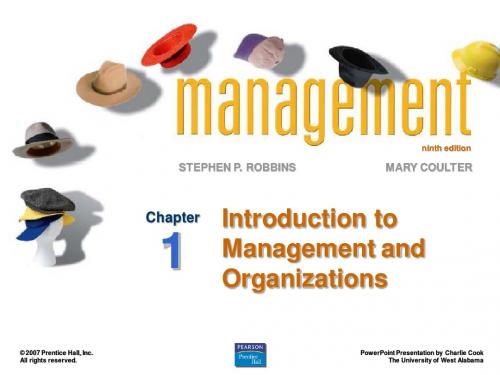
2007 Prentice Hall, Inc. All rights reserved.
1–11
Effectiveness refers to the relationship between inputs and outputs. Effectiveness is concerned with the means of getting things done, while efficiency is concerned with the attainment of organizational goals. A goal of efficiency is to minimize resource costs. Efficiency is often referred to as "doing things right."
Management Roles Approach (Mintzberg)
Interpersonal roles
Figurehead, leader, liaison
Informational roles
Monitor, disseminator, spokesperson
Decisional roles
Explain the universality of management concept. Discuss why an understanding of management is important. Describe the rewards and challenges of being a manager.
Someone who coordinates and oversees the work of other people so that organizational goals can be accomplished.
《管理学(全英)》-课程教学大纲
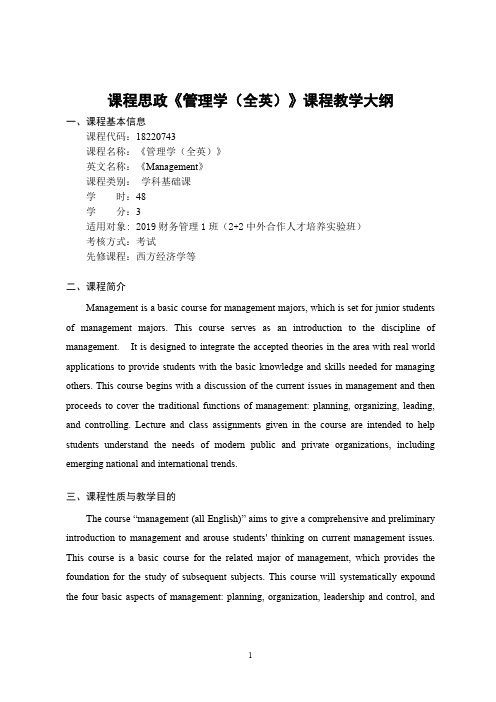
课程思政《管理学(全英)》课程教学大纲一、课程基本信息课程代码:18220743课程名称:《管理学(全英)》英文名称:《Management》课程类别:学科基础课学时:48学分:3适用对象:2019财务管理1班(2+2中外合作人才培养实验班)考核方式:考试先修课程:西方经济学等二、课程简介Management is a basic course for management majors,which is set for junior students of management majors.This course serves as an introduction to the discipline of management.It is designed to integrate the accepted theories in the area with real world applications to provide students with the basic knowledge and skills needed for managing others.This course begins with a discussion of the current issues in management and then proceeds to cover the traditional functions of management:planning,organizing,leading, and controlling.Lecture and class assignments given in the course are intended to help students understand the needs of modern public and private organizations,including emerging national and international trends.三、课程性质与教学目的The course“management(all English)”aims to give a comprehensive and preliminary introduction to management and arouse students'thinking on current management issues. This course is a basic course for the related major of management,which provides the foundation for the study of subsequent subjects.This course will systematically expound the four basic aspects of management:planning,organization,leadership and control,andwill try to apply the theory into case analysis under the guidance of teachers.At the end of the course,students should be able to analyze problems in the management field from a more professional perspective and master common technical terms in the field.Due to the basic course of management,the study of this course also lays a foundation for the subsequent study of related courses,such as strategic management,human resource management,e-commerce,organizational behavior,etc.This course uses English textbooks and the classroom language is English.Therefore,it has a higher requirement for the teaching object.Students should generally have a high level of English,and have strong oral English ability.Through the study of this course,four teaching objectives can be achieved:1.The construction of management knowledge system:to enable students to master thebasic concepts and connotations of management,various management theories, knowledge construction and curriculum system construction.2.The improvement of various skills:to enable students to think and analyze themanagement phenomenon in today's business environment with all kinds of knowledge, and break through traditional knowledge to achieve thinking innovation.3.The improvement of English listening,speaking,reading and writing ability:as thiscourse is an all-English teaching form,it will have requirements on students'English skills in all aspects.4.The strengthening of ideological and political education:to enable students tocomprehensively and objectively understand contemporary China and look at the outside world,be good at distinguishing right from wrong,and form a stand,viewpoint and method for observing and understanding contemporary world and contemporary China.四、教学内容及要求Chapter1The introduction of management:history,concepts and framework Chapter main Contents:1.Tell who managers are?2.What three characteristics do all organizations share?3.What’s the definition of management?4.Make comparison between managers and non-managerial employees.5.Three ways to look at what managers do.6.Explain why it’s important to study management.7.Describe the factors that are reshaping and redefining management.8.Scientific Management,General Administrative Theory,Behavioral Approach,Systems Approach.Chapter Objectives:Emphasis:1.Understand three Common Characteristics of Organizations.2.what’s the difference between Managers and non-managerial Employees?Difficulties:what does a manager do?Elements of ideological and political education:patriotismChapter Assignments:Please list at least three kinds of job titles in modern company and attribute these titles to four management levels.Chapter2The management environment analyses and applicationChapter main Contents:1.Explain what the external environment is and why it’s important?2.Discuss how the external environment affects managers?3.Define what organizational culture is?4.Describing the dimensions of organizational culture.5.How organizational culture affects managers?Chapter Objectives:Emphasis:what does external environment include?And how these factors affect the management?Difficulties:know the organizational culture?And how to evaluate an organization’s culture?Elements of ideological and political education:an international visionChapter Assignments:Please select one industry you are interested in and make the analyses about it’s external environment?Chapter3Integrative managerial issuesChapter main Contents:1.How to understand the concept of“globalization”and its reflection.2.What’s the influence of globalization on organizations?3.How organizations go global?And what are the different types of globalorganizations?4.What managers need to know about the management in global business?5.Discuss how society’s expectations are influencing managers and organizations.6.Discuss the factors that lead to ethical and unethical behavior in organizations.7.Describe how the workforce is changing and its impact on the way organizations aremanaged.Chapter Objectives:Emphasis:1.The meaning of globalization and it’s effect on management2.the diversity of workforceDifficulties:understanding the effect of firm globalization on company management.Elements of ideological and political education:an holistic viewChapter Assignments:Please conclude the effects of globalization effects on company management.Chapter4Foundation of decision makingChapter main Contents:1.Describe the decision-making process and some points about every step.2.What common errors are committed in the decision-making process?(12commondecision errors)3.Explain the three approaches managers can use to make decisions.4.Describe the types of decisions and decision-making conditions managers face.5.Discuss group decision-making,knowing the advantage and disadvantage of groupdecision making.6.When are groups most effective?7.Discuss contemporary issues in managerial decision making(national culture,creativity and design thinking,big data)Chapter Objectives:Emphasis:The three levels of analysis in the OB model.Difficulties:The need for a contingency approach to the study of OB.Elements of ideological and political education:socialism with Chinese characteristicsChapter Assignments:Think over whether you have made some errors in decision making?What’s it?Chapter5Foundation of planningChapter main Contents:1.Discuss the nature and purposes of planning?2.Since changing is ever-stopping,is the formal planning necessary?3.Explain what strategic includes and what managers do in the strategic managementprocess?4.What strategies do mangers use?pare approaches to goal setting and planning.6.How do managers set goals and develop plans?7.What contemporary issues in planning do managers face?Chapter Objectives:Emphasis:1.The company strategy system2.The content of MBO3.The steps and methods of goal-settingDifficulties:1.The essence of MBO2.The company strategy systemElements of ideological and political education:confidence in our path,in our theoriesChapter Assignments:If“The don’t change thing is change itself”is the real fact,what’s the meaning of planning?Chapter6Organizational structure and designChapter main Contents:1.What are the six key elements in organizational design?(specialization,departmentalization,authority,span of control,centralization,formalization)2.Identify the contingency factors that favor either the mechanistic model or theorganic model of organizational design.pare traditional and contemporary organizational designs.4.Discuss the design challenges faced by today’s organizations.(keep employeesconnected,global difference,building a learning organization,flexible workarrangement and so on)Chapter Objectives:Emphasis:The six key elements in organizational design.Difficulties:The design challenges faced by today’s organizations.Elements of ideological and political education:confidence in our systemChapter Assignments:Do you think the traditional hierarchical structure still have life today? Chapter7Managing human resourcesChapter main Contents:1.Describe the key components of the human resource management process andthe important influences on that process.2.What’s employment planning?And what’s the two steps of it?3.How do organizations recruit employees?And how to handle layoffs?4.How do managers select competent employees?5.What is employees are provided with needed skills and knowledge?6.Describe strategies for retaining competent,high-performing employees.7.Discuss contemporary issues in managing human resources.Chapter Objectives:Emphasis:1.The process of human resource management;2.How to compensate the employees;3.How to retain competent,high-performing employees.Difficulties:Grasping the process of HRM and how to match the job requirements and employee?Elements of ideological and political education:China’s national conditionChapter Assignments:How to retain the90s and00s employees?Chapter8Managing change and innovationChapter main Contents:1.Define organizational change and the categories of organizational change.2.what forces lead to organizations make change?pare the change process.(CALM WATERS VS.WHITE-WATERMETAPHOR)4.what forces resist the organization change?5.Explain how to manage resistance to change?6.What managers need to know about employee stress?7.Discuss techniques for stimulating innovation.Emphasis:1.What’s organizational change are companies confronted with?2.What can the companies do to eliminate the employees’stress?3.How to create innovation?Difficulties:What can companies do to make the organization more creative?Elements of ideological and political education:a sense of prideChapter Assignments:1.What method do you know about prompting one more creative?2.Do you have some method to decrease the stress?Chapter9Group and managing work teamsChapter main Contents:1.What’s the definition of group and what are the stages of group development?2.Describe the five major concepts of group behavior.(roles,norms andconformity,status systems,group size,group cohesiveness)3.How groups are turned into effective teams?From context,composition,workdesign and process perspectives.4.What contemporary issues do managers face in managing teams?(managingglobal team,)Chapter Objectives:Emphasis:1.how to build an effective work team?2.what issues does a manager must confronted with in new environments?Difficulties:How to build an effective work team?Elements of ideological and political education:organization confidenceChapter Assignments:Do you want to work in team or work individually?Why?Chapter10Motivating and rewardingChapter main Contents:1.Define and explain motivation and what’s three elements of motivation?pare four early theories of motivation(Maslow’s Hierarchy of NeedsTheory,X-Y Theory,Two-Factor Theory,McClelland’s Three-needs Theory)3.What’s goal-setting theory?4.How does job design influence motivation?5.What’s equity theory?6.What current issues do managers face in motivating employees?Chapter Objectives:Emphasis:Compare and integrate the classical and modern motivation theoryDifficulties:How to apply these motivation theories to realities?Elements of ideological and political education:responsibilityChapter Assignments:What factors can motivate you working harder?Chapter11Leadership and trustChapter main Contents:1.Who is leader and what is leadership?2.What traits do leaders have according trait theory?3.What behaviors do leaders exhibit?4.Describe the four major contingency leadership theories.5.Describe modern views of leadership and the issues facing today’s leaders.6.Why trust is the essence of leadership?Chapter Objectives:Emphasis:How to understand the contingency leadership theory?Difficulties:How to understand the essence role of trust in leadership?Elements of ideological and political education:integrity and honestyChapter Assignments:Imaging you are a leader,what do you want to do to build the trust relationship with employees?Chapter12Managing communication and informationChapter main Contents:1.Describe what managers need to know about communicating effectively.2.Explain how technology affects managerial communication.3.Discuss contemporary issues in communication.Chapter Objectives:Emphasis:1.What’s the process of communication?paring written communications and verbal communication.3.Which factors will lead to the ineffectiveness in communication?4.How to enhance the communication effect?5.Understanding the effects of some technology on managing communication.6.What communication issues do managers face today?Difficulties:How to tackle the resistance when communication?Elements of ideological and political education:development and innovationChapter Assignments:Please recall the last low-efficient communication case in your daily life and analyze the reason.Chapter13Foundation of controlChapter main Contents:1.What is control and why control is important?2.Describe the three steps in the control process.(get measuring,compare actualperformance to planned goals,take actions)3.When does control take place?4.Discuss the types of controls organizations and managers use.5.What contemporary control issues do managers confront?Chapter Objectives:Emphasis:Grasp three kinds of control.Difficulties:When does control take place?Elements of ideological and political education:ideal and faithChapter Assignments:Which method do you think is most effective when controlling?why?五、各教学环节学时分配Presentation and debate033 Chapter9Group and managing work teams33 Chapter10Motivating and rewarding(I)33 Chapter10Motivating and rewarding(II)213 Chapter11Leadership and trust33 Chapter12Managing communication and213 informationChapter13Foundation of control33 Review and answering033六、推荐教材和教学参考资源1、《21世纪的管理挑战》,彼得.德鲁克著2、《创新者的窘境》&《创新者的解答》,克莱顿•克里斯坦森著3、《竞争战略》迈克尔.波特著4、《影响力》罗伯特.西奥迪尼著5、《定位》艾·里斯,杰克·特劳特著6、《商战》杰克•特劳特/阿尔•里斯著7、《联盟:互联网时代的人才变革》里德·霍夫曼著8、《重新定义管理》布赖恩·罗伯逊著七、其他说明大纲修订人:田野修订日期:2020/12/10大纲审定人:赵明审定日期:2020/12/16。
管理学,罗宾斯,版,英文Robbinsfom

1-26
Why Are Customers Important?
Consistent, high-quality customer service is essential to survival
Copyright © 2015 Pearson Education, Inc.
1-27
Why Is Innovation Important?
1-19
Which Approach Takes the Prize?
Functions ☑
Roles
☐
Copyright © 2015 Pearson Education, Inc.
1-20
What Skills Do Managers Need?
Conceptual Skills
Interpersonal Skills
1-22
Why Study Management?
We all have a vested interest in improving how organizations are managed.
Copyright © 2015 Pearson Education, Inc.
1-23
Why Study Management? (cont.)
1-6
Copyright © 2015 Pearson Education, Inc.
1-7
What Titles Do Managers Have?
Top Managers • Make decisions about the direction of an organization
Middle Managers • Manage other managers
管理学(英语)教学大纲

《管理学(英语)》教学大纲课程编号:课程类型:学科基础课总学时:48讲课学时:实验(上机)学时:学分:3适用对象:工业工程先修课程:无一、课程的教学目标《管理学(英语)》是为工商管理学院工商管理专业国际班本科生开设的专业基础课,本课程通过全英文授课的形式,向学生传授管理学的基本概念、重点理论和一般方法,帮助学生树立和开阔国际化视野,熟悉前沿的现代管理理念,培养较高的管理学科素养,为进一步学习专业管理课程和从事管理工作打下坚实的管理知识基础。
同时,通过本课程的学习,学生将具备较高水平的管理学专业英语阅读能力和运用英语进行管理沟通的能力,进而为将来学习其他管理学相关的双语或全英文课程、出国交流与深造、加入国际化公司工作奠定基础。
二、教学基本要求(黑体,小四号字)教学基本要求应包括:本课程主要教学内容包括管理与组织导论、管理思想史、织的文化与环境、全球环境中的管理、社会责任与管理道德、决策、计划、战略管理、组织结构与设计、管理沟通与信息技术、人力资源管理、变革与创新管理、领导、理解群体与团队、激励员工、控制、运营等。
其中,社会责任与管理道德、决策、战略管理、变革与创新管理、领导、理解群体与团队等内容将采取课堂教授与案例分析方法,以便学生能够灵活掌握这些章节的知识点。
教学方法与手段:运用启发式教学、案例教学等方式,寓教于乐,激发学生的学习热情,强调学生在课堂学习中的自主意识,主张使学生成为课堂的主人,在教学中运用多媒体手段并配合板书,强调学习过程学生的参与。
对实践教学环节的要求:为了保证学生在课后能积极思考,课后需要布置一定量的案例讨论或思考题,并在下节课留出一定课时在课堂讨论,课堂发言和课后作业作为平时成绩之一。
课程的考核方式:建议本课程综合采用多种考核方法,案例分析成绩占总成绩40%,期末考试宜采取闭卷的方式,占总成绩的60%。
三、各教学环节学时分配(黑体,小四号字)教学课时分配4.3 Doing Business Globally.4.4 Managing In A Global Environment.四、教学内容Chapter1Introduction to Management and Organizations1.1 Who Are Managers?▪Explain how managers differ from non-managerial employees.▪Describe how to classify managers in organizations.1.2 What Is Management?▪Define management.▪Explain why efficiency and effectiveness are important to management.1.3 What Do Managers Do?▪Describe the four functions of management.▪Explain Mintzberg’s managerial roles.▪Describe Katz’s three essential managerial skills and how the importanceof these skills changes depending on managerial level.▪Discuss the changes that are impacting manager’s jobs.▪Explain why customer service and innovation are important to the manager’s job.1.4 What Is An Organization?▪Explain the characteristics of an organization.▪Describe how today’s organizations are structured.1.5 Why Study Management?▪Discuss why it’s important to understand management.▪Explain the universality of management concept.▪Describe the rewards and challenges of being a manager.教学重点、难点:本章重点讲授管理的基本概念、职能,管理者的类型、角色和技能,管理学科与其他学科的关系。
802《管理学》课程教学大纲_管理学
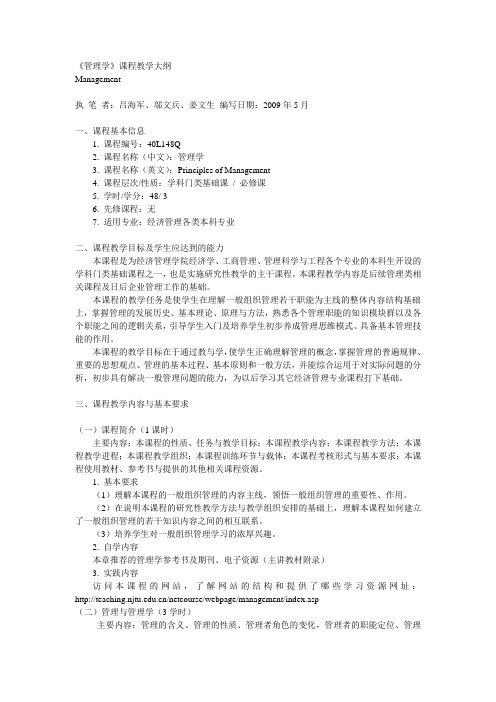
《管理学》课程教学大纲Management执笔者:吕海军、邬文兵、姜文生编写日期:2009年5月一、课程基本信息1. 课程编号:40L148Q2. 课程名称(中文):管理学3. 课程名称(英文):Principles of Management4. 课程层次/性质:学科门类基础课/ 必修课5. 学时/学分:48/ 36. 先修课程:无7. 适用专业:经济管理各类本科专业二、课程教学目标及学生应达到的能力本课程是为经济管理学院经济学、工商管理、管理科学与工程各个专业的本科生开设的学科门类基础课程之一,也是实施研究性教学的主干课程。
本课程教学内容是后续管理类相关课程及日后企业管理工作的基础。
本课程的教学任务是使学生在理解一般组织管理若干职能为主线的整体内容结构基础上,掌握管理的发展历史、基本理论、原理与方法,熟悉各个管理职能的知识模块群以及各个职能之间的逻辑关系,引导学生入门及培养学生初步养成管理思维模式、具备基本管理技能的作用。
本课程的教学目标在于通过教与学,使学生正确理解管理的概念,掌握管理的普遍规律、重要的思想观点、管理的基本过程、基本原则和一般方法,并能综合运用于对实际问题的分析,初步具有解决一般管理问题的能力,为以后学习其它经济管理专业课程打下基础。
三、课程教学内容与基本要求(一)课程简介(1课时)主要内容:本课程的性质、任务与教学目标;本课程教学内容;本课程教学方法;本课程教学进程;本课程教学组织;本课程训练环节与载体;本课程考核形式与基本要求;本课程使用教材、参考书与提供的其他相关课程资源。
1. 基本要求(1)理解本课程的一般组织管理的内容主线,领悟一般组织管理的重要性、作用。
(2)在说明本课程的研究性教学方法与教学组织安排的基础上,理解本课程如何建立了一般组织管理的若干知识内容之间的相互联系。
(3)培养学生对一般组织管理学习的浓厚兴趣。
2. 自学内容本章推荐的管理学参考书及期刊、电子资源(主讲教材附录)3. 实践内容访问本课程的网站,了解网站的结构和提供了哪些学习资源网址:/netcourse/webpage/management/index.asp(二)管理与管理学(3学时)主要内容:管理的含义、管理的性质、管理者角色的变化,管理者的职能定位、管理学的基本原理,本章案例。
《管理学英语(1)》课程大纲

《管理学英语(1)》课程大纲课程编码:JY10161课程性质:公共基础课教学时数:周学时2,总学时36;学分:2先修课程:《大学英语》,包括综合英语及英语听力课程, 管理学,人力资源管理教学目的与要求: 本课程是针对人力资源专业学生开设的专门用途英语(English for Specific Purposes)课程,本课程通过有机结合基础英语技能和人力资源专业知识,使学生熟练掌握国际人力资源领域内的词汇、术语、句法、表达特点和语言运用规律,训练学生用英语表述人力资源管理方面的基本概念,并注重交际能力、合作能力、独立提出建议和讨论问题的能力等的培养,全面提升学生在商务环境下综合运用英语进行人力资源管理的能力。
通过一个学期的教学,学生应达到以下基本要求:(1)熟练阅读人力资源管理专业英语资料。
(2)了解人力资源管理常用术语、常用文件格式及写作方法。
(3)能够使用流畅的英语进行人力资源管理案例分析。
使用教材:(1)English for Human Resource Management, 高嘉勇, 南开大学出版社, 2007;(2)自编散页教材;(3)自选音像资料。
参考书目:(1)Buchanan, D. (2000) 'The ongoing rediscovery of teamworking as a management idea', in Procter, S. and Mueller, F. (eds) Teamworking, London, MacMillan(2) Findlay, P., McKinlay, A. Marks, A. and Thompson, P (2000) 'The use and abuse of teamwork skills', in Procter, S. and Mueller, F. (eds) Teamworking, London, MacMillan(3) Heery, E. and Noon, M. (2001) (Eds.) A dictionary of human resource management, Oxford(4) Bach, S. (2000). From Appraisal to Management Personnel Management. In Bach, S. and Sission, K. (eds) Personnel Management. Blackwells.(5) Porter, L., Lawler, E. and Hackman, R. (1975) Behavior in Organizations. New York: McGraw-Hill.(6) Storey, J. (1992). Developments in the Management of Human Resources. Oxford: Basil Blackwell(7) Swan, W. S. (1991). How to Do a Superior Performance Appraisal. New York: John Wiley.授课内容: 本课程主要围绕与人力资源管理相关的各种主题来组织教学,侧重点在与商务英语语言知识的学习及应用。
management 企业管理类英文版PPT课件 (9)

“General Welfare” Clause
• Originally controversial, the “General
Welfare” clause conferred on Congress broad powers to tax and spend for the general welfare of the United States.[1]
Chapter 3 Legal Framework for Financing Public Education
Federal Role in Education
• The federal government has a
long precedent of providing education programs, funds, & initiatives to the states • Without federal intervention, many initiatives may not have been started, and many injustices would have continued longer
• • •
•
• •
A Historical & Legal perspective and Guiding principles regarding Taxation Equal protection State & Federal Constitutional language Adequacy Vouchers and charter schools Tuition tax credits
Federal Involvement in Education ONLY When…
管理学教学大纲
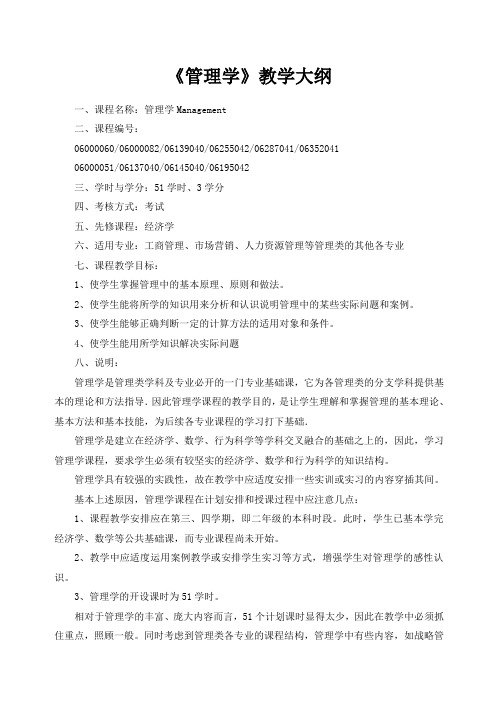
《管理学》教学大纲一、课程名称:管理学Management二、课程编号:06000060/06000082/06139040/06255042/06287041/0635204106000051/06137040/06145040/06195042三、学时与学分:51学时、3学分四、考核方式:考试五、先修课程:经济学六、适用专业:工商管理、市场营销、人力资源管理等管理类的其他各专业七、课程教学目标:1、使学生掌握管理中的基本原理、原则和做法。
2、使学生能将所学的知识用来分析和认识说明管理中的某些实际问题和案例。
3、使学生能够正确判断一定的计算方法的适用对象和条件。
4、使学生能用所学知识解决实际问题八、说明:管理学是管理类学科及专业必开的一门专业基础课,它为各管理类的分支学科提供基本的理论和方法指导.因此管理学课程的教学目的,是让学生理解和掌握管理的基本理论、基本方法和基本技能,为后续各专业课程的学习打下基础.管理学是建立在经济学、数学、行为科学等学科交叉融合的基础之上的,因此,学习管理学课程,要求学生必须有较坚实的经济学、数学和行为科学的知识结构。
管理学具有较强的实践性,故在教学中应适度安排一些实训或实习的内容穿插其间。
基本上述原因,管理学课程在计划安排和授课过程中应注意几点:1、课程教学安排应在第三、四学期,即二年级的本科时段。
此时,学生已基本学完经济学、数学等公共基础课,而专业课程尚未开始。
2、教学中应适度运用案例教学或安排学生实习等方式,增强学生对管理学的感性认识。
3、管理学的开设课时为51学时。
相对于管理学的丰富、庞大内容而言,51个计划课时显得太少,因此在教学中必须抓住重点,照顾一般。
同时考虑到管理类各专业的课程结构,管理学中有些内容,如战略管理,人力资源管理等已在有些专业成为专门的课程,故在教学中,凡可能与其它课程重复的内容一般少讲或不讲。
4、本大纲作为教学、考试的依据。
为充分发挥广大师生在教学中的灵活性、创造性,本大纲的规定是粗线条的,教师在授课过程中在遵循本大纲基本内容的前提下,可灵活发挥,甚至可超出大纲的内容,讲课的章节顺序也可灵活调整,但考试必须以本大纲为依据,统一命题,统一阅卷。
管理学48学时

《管理学》课程教学大纲课程编号:ABGS0201课程中文名字:管理学英文名称:The Fundamental of Management课程性质:专业基础课课程学分数:3学分课程学时数:48学时授课对象:工商管理、信息管理与信息系统本课程的前导课程:一、课程简介通过本课程的教学,使学生较系统地了解管理学的概貌,掌握管理学的基本理论和基本方法,培养学生的管理素质。
二、教学基本内容和基本要求(一)管理活动与管理理论教学内容:管理活动:管理的定义、管理的职能、管理者的角色。
中外早期管理思想:中国早期管理思想、外国早期管理思想。
管理理论的形成与发展:古典管理理论、行为管理理论、数量管理理论、系统管理理论、权变管理理论、质量管理理论。
重点、难点:管理职能,管理者的角色与技能。
课程教学要求:了解:中外早期的管理思想;掌握:管理理论的形成和发展。
(二)道德与社会责任教学内容:道德概述:道德的定义,五种道德观。
影响管理者道德素质的因素:道德发展阶段,个人特征,结构变量,组织文化,问题强度。
提高员工道德素质的途径:挑选高道德素质的员工,建立道德准则和决策规则,在道德方面领导员工,设定工作目标,对员工进行道德教育,对绩效进行全面评价,进行独立的社会审计,提供正式的保护机制。
社会责任概述:社会责任的定义,两种社会责任观,社会责任与经营业绩。
社会责任的具体体现:企业对环境的责任,企业对员工的责任,企业对顾客的责任,企业对竞争对手的责任,企业对投资者的责任,企业对所在社区的责任。
重点、难点:影响管理者道德素质的因素。
课程教学要求:了解:提高员工道德素质的途径,社会责任的具体体现;掌握:道德概念,社会责任概述、影响管理者道德素质的因素。
(三)信息获取教学内容:信息概述:定义,对信息的评估,有用信息的特征。
信息系统:信息系统的要素,信息系统的开发步骤,以计算机为基础的信息系统在组织中的应用。
其他信息技术:电信和网络,人工智能,办公自动化。
罗宾斯《管理学》内容概要,中英文对照
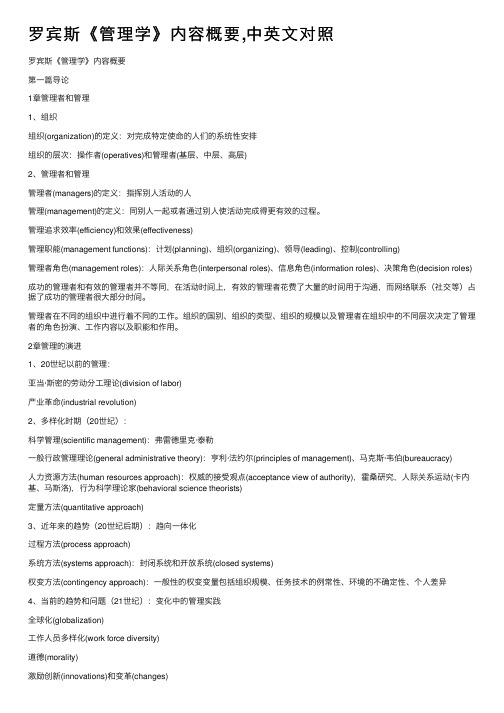
罗宾斯《管理学》内容概要,中英⽂对照罗宾斯《管理学》内容概要第⼀篇导论1章管理者和管理1、组织组织(organization)的定义:对完成特定使命的⼈们的系统性安排组织的层次:操作者(operatives)和管理者(基层、中层、⾼层)2、管理者和管理管理者(managers)的定义:指挥别⼈活动的⼈管理(management)的定义:同别⼈⼀起或者通过别⼈使活动完成得更有效的过程。
管理追求效率(efficiency)和效果(effectiveness)管理职能(management functions):计划(planning)、组织(organizing)、领导(leading)、控制(controlling)管理者⾓⾊(management roles):⼈际关系⾓⾊(interpersonal roles)、信息⾓⾊(information roles)、决策⾓⾊(decision roles)成功的管理者和有效的管理者并不等同,在活动时间上,有效的管理者花费了⼤量的时间⽤于沟通,⽽⽹络联系(社交等)占据了成功的管理者很⼤部分时间。
管理者在不同的组织中进⾏着不同的⼯作。
组织的国别、组织的类型、组织的规模以及管理者在组织中的不同层次决定了管理者的⾓⾊扮演、⼯作内容以及职能和作⽤。
2章管理的演进1、20世纪以前的管理:亚当·斯密的劳动分⼯理论(division of labor)产业⾰命(industrial revolution)2、多样化时期(20世纪):科学管理(scientific management):弗雷德⾥克·泰勒⼀般⾏政管理理论(general administrative theory):亨利·法约尔(principles of management)、马克斯·韦伯(bureaucracy)⼈⼒资源⽅法(human resources approach):权威的接受观点(acceptance view of authority),霍桑研究,⼈际关系运动(卡内基、马斯洛),⾏为科学理论家(behavioral science theorists)定量⽅法(quantitative approach)3、近年来的趋势(20世纪后期):趋向⼀体化过程⽅法(process approach)系统⽅法(systems approach):封闭系统和开放系统(closed systems)权变⽅法(contingency approach):⼀般性的权变变量包括组织规模、任务技术的例常性、环境的不确定性、个⼈差异4、当前的趋势和问题(21世纪):变化中的管理实践全球化(globalization)⼯作⼈员多样化(work force diversity)道德(morality)激励创新(innovations)和变⾰(changes)全⾯质量管理(total quality management, TQM):由顾客需要和期望驱动的管理哲学授权(delegation)⼯作⼈员的两极化(bi-modal work force)3章组织⽂化与环境:管理的约束⼒量1、组织组织⽂化(organizational culture)被⽤来指共有的价值体系。
管理学原理资料整理(中英文版)
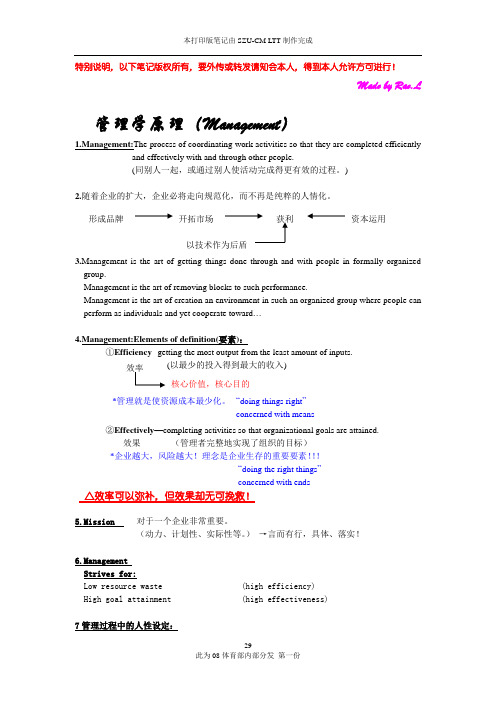
特别说明,以下笔记版权所有,要外传或转发请知会本人,得到本人允许方可进行!Made by Rae.L管理学原理(Management )1.Management:The process of coordinating work activities so that they are completed efficientlyand effectively with and through other people.(同别人一起,或通过别人使活动完成得更有效的过程。
)2.随着企业的扩大,企业必将走向规范化,而不再是纯粹的人情化。
group.Management is the art of removing blocks to such performance.Management is the art of creation an environment in such an organized group where people can perform as individuals and yet cooperate toward …4.Management:Elements of definition(要素):①Efficiency --getting the most output from the least amount of inputs.(以最少的投入得到最大的收入)②Effectively —completing activities so that organizational goals are attained.效果 (管理者完整地实现了组织的目标)*企业越大,风险越大!理念是企业生存的重要要素!!!--“doing the right things ”--concerned with ends△效率可以弥补,但效果却无可挽救!5.Mission 对于一个企业非常重要。
(动力、计划性、实际性等。
《管理学》Management英文大纲
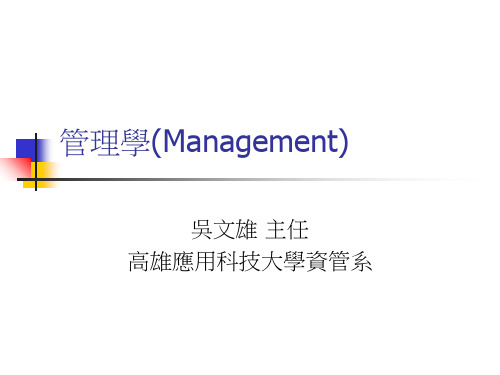
Part 5 Leading
Chapter 14 Foundations of Behavior
Why look at individual behavior? Attitudes Personality Perception Learning
Part 5 Leading(Cont’d)
Defining organizational structure Organizational design decisions Common organizational designs
Part 4 Organizing(Cont’d)
Chapter 11 Managerial Communication and Information Technology
Chapter 15 Understanding Groups and Teams
Understanding group behavior Turning group into effective teams Developing and managing effective teams
Part 5 Leading(Cont’d)
achieve high performance levels
What is planning? Why do managers plan? How do managers plan? Contemporary issues in planning
Part 3 Planning(Cont’d)
Chapter 8 Strategic Management
Part 2 Defining the Manager’s Terrain(Cont’d)
Chapter 4 Managing in a Global Environment
管理学 课程教学大纲
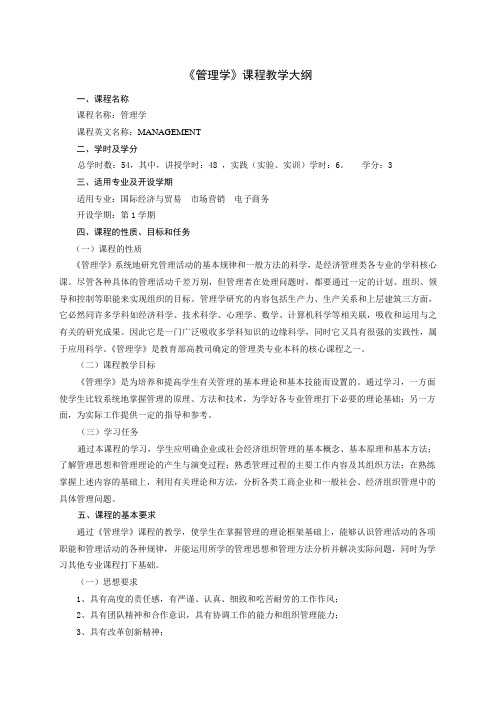
《管理学》课程教学大纲一、课程名称课程名称:管理学课程英文名称:MANAGEMENT二、学时及学分总学时数:54,其中,讲授学时:48 ,实践(实验、实训)学时:6。
学分:3三、适用专业及开设学期适用专业:国际经济与贸易市场营销电子商务开设学期:第1学期四、课程的性质、目标和任务(一)课程的性质《管理学》系统地研究管理活动的基本规律和一般方法的科学,是经济管理类各专业的学科核心课。
尽管各种具体的管理活动千差万别,但管理者在处理问题时,都要通过一定的计划、组织、领导和控制等职能来实现组织的目标。
管理学研究的内容包括生产力、生产关系和上层建筑三方面,它必然同许多学科如经济科学、技术科学、心理学、数学、计算机科学等相关联,吸收和运用与之有关的研究成果。
因此它是一门广泛吸收多学科知识的边缘科学,同时它又具有很强的实践性,属于应用科学。
《管理学》是教育部高教司确定的管理类专业本科的核心课程之一。
(二)课程教学目标《管理学》是为培养和提高学生有关管理的基本理论和基本技能而设置的。
通过学习,一方面使学生比较系统地掌握管理的原理、方法和技术,为学好各专业管理打下必要的理论基础;另一方面,为实际工作提供一定的指导和参考。
(三)学习任务通过本课程的学习,学生应明确企业或社会经济组织管理的基本概念、基本原理和基本方法;了解管理思想和管理理论的产生与演变过程;熟悉管理过程的主要工作内容及其组织方法;在熟练掌握上述内容的基础上,利用有关理论和方法,分析各类工商企业和一般社会、经济组织管理中的具体管理问题。
五、课程的基本要求通过《管理学》课程的教学,使学生在掌握管理的理论框架基础上,能够认识管理活动的各项职能和管理活动的各种规律,并能运用所学的管理思想和管理方法分析并解决实际问题,同时为学习其他专业课程打下基础。
(一)思想要求1、具有高度的责任感,有严谨、认真、细致和吃苦耐劳的工作作风;2、具有团队精神和合作意识,具有协调工作的能力和组织管理能力;3、具有改革创新精神;4、能够自动自发运用管理知识进行职业养成;5、增强学生的自我管理意识,提高学生自主学习的能力,增强对上级的下属意识、增强对下级的管理意识。
- 1、下载文档前请自行甄别文档内容的完整性,平台不提供额外的编辑、内容补充、找答案等附加服务。
- 2、"仅部分预览"的文档,不可在线预览部分如存在完整性等问题,可反馈申请退款(可完整预览的文档不适用该条件!)。
- 3、如文档侵犯您的权益,请联系客服反馈,我们会尽快为您处理(人工客服工作时间:9:00-18:30)。
communication Organizational communication Understanding information technology
Part ห้องสมุดไป่ตู้ Introduction(Cont’d)
Chapter 2 Management Yesterday and Today
Management’s connection to other fields of study Historical background of management Scientific management General administrative theorists Quantitative approach to management Toward understanding organization behavior Current trends and issues
performance The “Greening” of management Managerial ethics A final thought
Part 3 Planning
Chapter 6 Decision-Making: The Essence of the Manager’s Job
Part 2 Defining the Manager’s Terrain(Cont’d)
Chapter 4 Managing in a Global Environment
Who owns what? What’s your global perspective? Understanding the global environment How organizations go global Managing in a global environment Is a global assignment for you?
Defining organizational structure Organizational design decisions Common organizational designs
Part 4 Organizing(Cont’d)
Chapter 11 Managerial Communication and Information Technology
Part 2 Defining the Manager’s Terrain(Cont’d)
Chapter 5 Social Responsibility and Managerial Ethics
What is social responsibility? Social responsibility and economic
The decision-making process The pervasiveness of decision making The manager as decision maker
Part 3 Planning(Cont’d)
Chapter 7 Foundations of Planning
The importance of strategic management The strategic management process Types of organizational strategies
Part 3 Planning(Cont’d)
Chapter 9 Planning Tools and Techniques
管理學(Management)
吳文雄 主任 高雄應用科技大學資管系
內容(Contents)
Part 1Introduction Part 2 Defining the Manager’s Terrain Part 3 Planning Part 4 Organizing Part 5 Leading Part 6 Controlling
What is planning? Why do managers plan? How do managers plan? Contemporary issues in planning
Part 3 Planning(Cont’d)
Chapter 8 Strategic Management
Part 2 Defining the Manager’s Terrain
Chapter 3 Organizational Culture and the Environment: The Constraints
The manager: Omnipotent or Symbolic? The organization’s Culture The environment
Techniques for assessing the environment Techniques for allocating resources Contemporary planning techniques
Part 4 Organizing
Chapter 10 Organizational Structure and Design
Part 1 Introduction
Chapter1 Introduction to Management and Organization
Who are managers? What is management? What do managers do? What is an organization? Why study management?
